Onassis executive, Greek Aviation and Shipping Pioneer Paul J. Ioannidis tells the epic story of his life in DESTINY PREVAILS
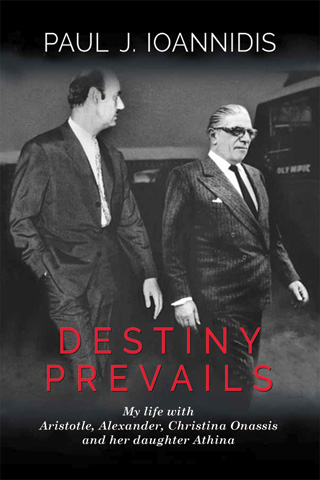
DESTINY PREVAILS
Paul J. Ioannidis, now 91, says the greater purpose of writing the book of his life was “to record some events involving the Onassis family that were heretofore unknown or which were not know to the wider public.” But the book is also the story of his own larger-than-life “destiny” that took him from joining the Greek Resistance as a teenager and moving on to become a pilot and eventually the captain of Onassis’ Olympic Airways and also the captain of his shipping fleet and a chief officer of his foundation. “This book reveals the character of Onassis, in particular, his courage, his vision, and his toughness,” writes Professor Athanasios Fokas in the introduction. But in equal measure it also describes Paul Ioannidis.
Why is the title of your book Destiny Prevails?
In the course of my life a series of events took place that led my steps and brought me all the way to where I stand now. Some people would call them “coincidence”, but I call it “destiny”.
As a youngster I had a dream: to join the Royal Navy and become an officer. My love for the sea was immense. The War came instead and in January 1943 I joined the Resistance in the Greek mountains as a member of Force 133, a British Commando Unit. In mid-June 1944 our Unit received orders to report to the Allied High Command in Cairo. We spent the night before our escape in a safe house in Athens. Next morning, the owner of the house made us some coffee and she insisted to tell us our fortune by reading the coffee cups. I quite reluctantly consented. The elderly lady examined the cup thoroughly and said “You are a pilot”. I assured her, several times that I was not. She insisted and she got very upset. Finally in a quite authoritative voice announced to me: “Even if you are not, you will become one!” I didn’t pay any attention, as such a thought had never crossed my mind.
When I arrived in Cairo, after a quite adventurous voyage, I met a family friend, a retired admiral, who promised to help me join the Greek Naval Academy, which was at the time operating in Alexandria. Two days later, I went back to see him and get the answer which, unfortunately, was negative due to the fact that the enrolment period was over. I was much disappointed and ready to collapse. Then a gentleman, who was sitting with him and whom I didn’t know (he proved to be the Minister of Air Force of the Greek Government in exile) asked me: “Would you like to join the Air Force?” “I was so dumbfounded that my only reaction was to ask: “To do what?”
“Become a pilot” he said, adding: “Think about it and come to see me in my office when you decide so”. I couldn’t sleep that night. I was very sad that the dream of my youth was flying away. And then I remembered the prophecy of the elderly lady and was quite mixed up. I eventually accepted and, after many obstacles, I joined the R.A.F. Training Center in Rhodesia and I was trained as a fighter pilot.
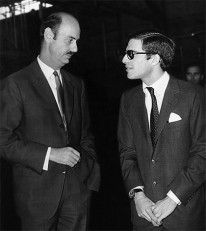
Paul Ioannidis with Alexander Onassis
After the War I joined the Greek Royal Air Force and sometime later I resigned and joined the Greek airline T.A.E. I became a DC-3 captain at the age of 25.
Some years passed by and Fate played its tricks again. I was lucky enough to meet Aristotle Onassis when he acquired the Greek airline T.A.E. in 1956 and renamed it Olympic Airways. After his death on March 5, 1975, and as a life time member of the Onassis Foundation, according to his Will, I finally “joined” the sea by becoming C.E.O. of Shipping and Commercial Operations of the Onassis Group.
So I believe it was my “destiny” to become a pilot and it was also my “destiny” to get involved with my “first love”, the sea, through Aristotle Onassis. After all, we should not forget that the Ancient Greeks believed that the force of “destiny” is a power beyond anybody’s control. Even Gods could not intervene and change a “destiny” determined by Fate.
Could you ever imagine the daring young man who joined the resistance would become a business paragon?
No, I could never imagine such a possibility even in my wildest dreams.
My only concern at the time was to fight for the liberation of my country. Any other thoughts about my future were buried in the back of my mind, but they were certainly focused on pursuing a career as a naval officer.
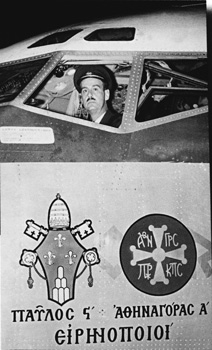
Paul J. Ioannidis
Did you bring your own daring to the business world before you ever joined Onassis?
When I joined the airline industry, I was only 23 years old. I had made up my mind that I would build up a career as an airline pilot and any future plans and ideas of my own would turn to this direction. In other words, I was prepared to apply my daring to projects that would promote the improvement of flight safety.
How did you work so well as a team?
Having a very long experience as an Airline Captain and Instructor as well as due to the managerial positions held – Chief Pilot, Flight Operations Director and Director General – I was aware of the great importance and effectiveness of the teamwork concept in achieving projects on time even under difficult situation.
Aristotle Onassis was a visionary with a very strong intuition, financial means and great courage, not only in his personal and social life, but also in his business ventures.
He was discussing with his executives various thoughts and specific projects mainly related to expedite the expansion of Olympic Airways in order to achieve his target and see the Greek airlines logo – the Olympic Circles – fly across the five continents.
Following a thorough feasibility study, the outcome was presented to him along with recommendations, so as he be able to take his final decision.
Initially, he was skeptical as he did not have any experience with airline operation, but his intuition helped him a lot.
Do you think Onassis approved of you because he saw you both as a no-nonsense executive and a fellow risk-taker?
Onassis approved of me because he believed he could rely on me and get a frank opinion and consistent professional advice in his business projects concerning the expansion of Olympic Airways.
Risk taking has quite a relative meaning, depending on the side from which you are looking at it. Onassis was a very smart businessman but some ideas looked to him quite risky or even impossible, to realize.
From my side, however, being a professional that had carefully studied all parameters of a new venture, the project might not constitute a real risk, but merely a pioneering idea to the benefit of the airline.
In that sense, somebody could probably say that I was a fellow risk-taker, but in reality, I was definitely not.
Did you ever consider venturing out on your own into business?
I never considered starting my own business. After all I am too sentimental to become a successful businessman! I always took great satisfaction from my work either as simple pilot or, later, as a top executive of Olympic Airways and a Vice President of the Onassis Foundation and CEO of its shipping and commercial operations. Especially after the establishment of the Public Benefit Foundation, which performs an important task for the welfare of society, my satisfaction was even greater.
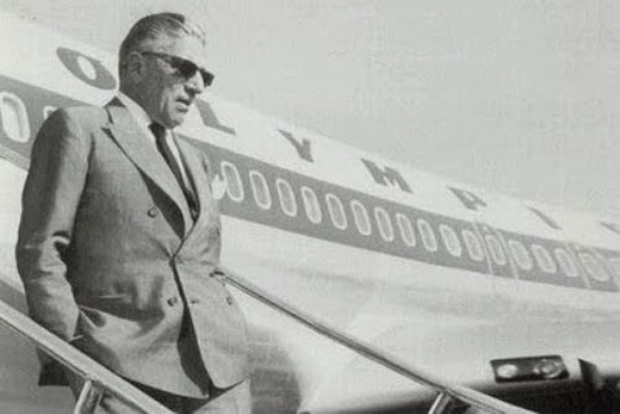
Olympic Airways, founded by Onassis, was one of the best airlines in the world
Do you still regret the loss of Olympic Airways?
I deeply regretted and I still regret the takeover of OA by the Greek government at that time, as I had not any doubt, whatsoever, that this new status would eventually lead to the phase out of the glorious Olympic Airways under the Onassis management. But more strong emotion and sadness stirred in me, for the death of Aristotle Onassis who did so much for the evolution of worldwide shipping and aviation in Greece and for the man who believed and trusted in me.
How is Olympic doing now?
The only very small slice which survived “Olympic Airways”, the famous Greek Airline of the five continents, created by Aristotle Onassis, which gained the respect of its competitors, the appreciation of its passengers and made all Greeks and especially those of diaspora very proud, is “Olympic Air”.
“Olympic Air” is a regional airline, subsidiary of the Greek airline carrier “Aegean Airlines”. Commenced its operation on September 29, 2009 and currently operates 14 Bombardier Dash 8 turboprop aircrafts on domestic routes.
What is the current stare of the aviation industry in Greece?
“Aegean Airlines S.A.” is currently the largest Greek Airline. Commenced operation on May 28, 1999 and operates an all Airbus fleet of 40 aircrafts, with schedules and charter services to domestic, European and Middle East destinations.
Joined the Star Alliance on June 30, 2010, it has received a number of awards as well as an increasing industry recognition, including five Skytrax awards within a period of six years (2009-2014) as the best Regional Airline in Europe.
How do you think it will survive the current political and economic climate?
It will definitely survive due to the fact that tourist flow to Greece has gone up significantly the last couple of years and it is anticipated to increase even further.
Do you still fly?
I often fly in my dreams! I wish I could do it in reality, but, fortunately enough there are rules and limitations in aviation that cannot and, should not be by-passed. I am 91 years old!
Why stay loyal to the family and the Onassis children all those years?
This relationship of mutual trust with Aristotle Onassis was built over a period of ten quite strenuous years of cooperation, as you can read in my book. I know that he had spoken about me to his children on many occasions.
My loyalty to Aristotle Onassis, after all that went through between us all these years, is and will certainly remain undivided and continuous. The same applies for Alexander and Christina as well.
Did you do it for the children or for him?
Of course I did it both for him and his children.
From the outside it seems a chaotic world: the world of the super rich and the often sad and chaotic world of their children. How did you yourself keep your bearings?
This is a true and quite unhappy situation. I had the chance to experience it with the Onassis children. Alexander was sensitive and had many good qualities. He was like a raw diamond. His father had an imposing personality. The fact that he was absorbed in his business and had to travel extensively left an irreplaceable gap. The children were missing normal family life and affection.
I tried to cope with the situation and convince Alexander that his father not only loved him, but he adored him and cherished him. Actually Alexander had the chance to realize that on a very special and quite sentimental occasion.
I had the chance to get very close with Christina after the death of Aristotle Onassis. She had a crushing personality and I can say that she was an immature replica of her father.
Her unstable personal life and her anguish to be loved and accepted might have its roots in the loneliness and lack of affection she experienced as a child. I treated her as my own daughter and she often turned to me for support in her difficult moments.
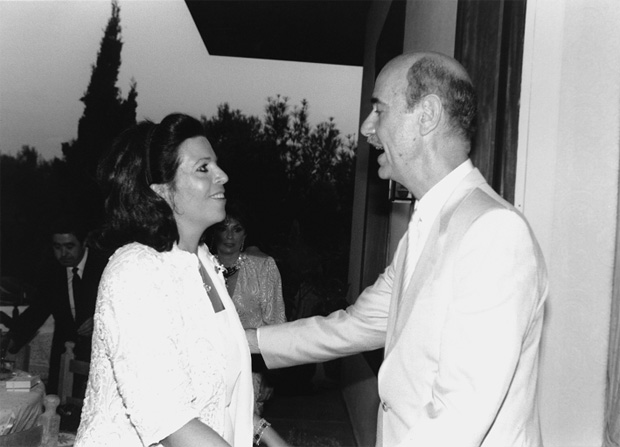
With Christina Onassis
Do you still think of them and what Christina and Alexander might have become?
Alexander was born to be a pilot. He had the physical and mental qualities required. He lacked discipline and was a bit reckless, but I believe that he would overcome this by proper training which he was already undertaking after my advice.
I am convinced that he would become an excellent and capable head of Olympic Airways and would expand it even further than his father.
At the same time he would also be the head of the shipping entity, assisted by his sister Christina who proved to be good in business.
I believe that both of them, with the assistance of capable and loyal executives, would manage to maintain and enhance the legacy of their father.
Are you in touch at all with Athina? How is she coping?
I saw Athina for the first time on January 30, 1985, just one day after she was born in Paris.
I also saw her on various occasions before and after her mother’s death. Last time I met her it was in the summers of 1994 and 1995 when she came to Skorpios Island with her family. Thereafter I haven’t seen her despite my wish to do so, due to the dispute with her father who was trying to take advantage of his daughter’s estate, whilst my colleagues and I were trying hard to safeguard her interests, as members of the Board of Administration of her estate.
Following a decision of the Onassis Foundation, on September 7, 2006 we sent an invitation to Athina to attend two events in Athens: first the opening of the exhibition entitled “Aristotle Onassis beyond his Myth” held on October 4, 2006, celebrating the centennial anniversary of her grandfather’s birth, the thirtieth anniversary of his death, and the thirtieth anniversary of the founding of the Alexander S. Onassis Public Benefit Foundation; and secondly, the awards ceremony for the international Onassis Prizes held on October 18, 2006. Athina did not respond, although her attorneys assured us in writing that they forwarded our letter to her. I am truly sorry for this.
Unfortunately, she was completely cut off from her Greek roots and has had no contact either with me or with the Foundation. I sent her my book in the hope that she will read it and learn from the horse’s mouth the true facts and situations developed in the past.
Despite all this, I send her my fondest wishes with all my heart, with the hope that she will always be healthy and happy alongside Alvaro and that they will create a wonderful family.
How does a private business survive the political hothouse atmosphere of Greece?
This is a timely and to the point question.I leave the answer to politicians and experts, as it is a very complicated and difficult issue to analyze.
How does a Foundation like Onassis survive and prosper?
When Aristotle Onassis was writing his will on Tuesday, January 3rd 1974 on a flight with his private Learjet from Acapulco, Mexico to New York, his legal counsel asked him: “What are we going to do for you Mr. Onassis?” He replied: “Keep my business running, I am the business.” But he had laid out what would happen once he was gone in his Will, a document that he wrote out by his hand. To honor his son, he bequeathed the share of his late son, to the Alexander S. Onassis Foundation, a business oriented entity that was to be established. This is what we have done and continue to do, running Alexander’s business share successfully, by having increased its value more than five times, apart spending more than one billion dollars in public benefit projects. Based on the by-laws of the Alexander S. Onassis Foundation, a second foundation was to be set up in Liechtenstein, under the name of Alexander S. Onassis Public Benefit Foundation, for the purpose of implementing public benefit projects. This foundation was to be funded with approximately 40% of the net profits from the business foundation. The balance of the profit remained in the business foundation for reinvestment or as reserve.
With this arrangement, Aristotle Onassis made sure that his foundation would survive, prosper and fulfill his wishes, provided for in his Will.
What do you see as its future and its future role?
I believe that the Alexander S. Onassis Foundation with its wise management will continue to prosper and will be funding in perpetuity the Alexander S. Onassis Public Benefit Foundation, which will carry on its public benefit projects in the areas of health, education, culture, environment and social solidarity, and thus it will keep the name of Aristotle Onassis alive forever.

Paul J. Ioannidis
What are you most proud of in your life?
My greatest pride and satisfaction is that during the course of my life I was able to be creative and contribute to the sectors of my professional and social activities.
At the age of 18, I joined the Resistance as a member of the British Commando Unit “Force 133” and had the chance to contribute to the struggle for the liberation of my country, from the Nazi occupation.
Subsequently, I was lucky enough to dedicate myself, for a long number of years, to the sectors of civil aviation, shipping and social solidarity.
This multiple contribution was recognized both by the Greek state as well as by various national and international organizations involved in aviation and shipping.
The major part of these awards is described in detail in my book, in the chapter “Distinctions”.
As a man of action, how do you cope with retirement?
This question is invalid. Who spoke about retirement? I am still there every day as life time member of the Board of Directors and the Advisory Committee, following most of the commercial activities for promoting the noble causes of the Foundation. I thank God for granting me health, courage and the spiritual endurance to make it through such an interesting journey along with the opportunity to test myself in good as well in bad times.
Do you plan to celebrate your centennial by flying?
The occasion seems so remote to me that I haven’t thought about it. Maybe this is an excellent idea. A friend of mine – far much younger than me, of course – is a passionate pilot and owns a light aircraft. We could organize a birthday party on air with a very few participants only, due to lack of space, and subsequently a big gathering with family and friends to celebrate my centennial, provided of course that I will still be around, and in one piece.
Is flying becoming too automated?
Yes, that is true. It is very helpful for the pilots, especially in the long range flights. But there is a “BUT” as well. It is natural that pilots are more relaxed with a fully automated aircraft. However, they must be very alert and meticulous in performing all their duties in general. More particularly- as an indication only-when setting the coordinates for the appropriate waypoints of their selected track to their destination, they must during flight cross check that they are on track by any available means (Korean Boeing 747 was shot down being off track over East Siberia on its flight from Europe to Seoul). And also practice so as to be capable in the remote case they lose autopilot automation to be able to continue fly, approach and land the aircraft manually at an airport of their discretion.
In the wake of the air disasters attributed to unstable pilots (such as Germanwings copilot Andreas Lubitz) what can airlines do to increase security?
The unbelievable cause of the tragic and fatal accident of Germanwings flight 9525 on March 24th, 2015 in the French Alps was unfolded only after analyzing the data of the two “black boxes” (Flying Data Recorder and Cockpit Voice Recorder) which were found within the debris of the crashed Airbus 320. As far the mental status of the copilot, Andreas Lubitz, and in view of the fact that he had discontinued his training in Arizona for six months on medical grounds and, if it is accurate that he was taking antidepressant medication as it was reported, the question arises why he was not under additional medical surveillance by a Lufthansa authorized doctor, which was a must. Furthermore I wonder how is it possible that someone within Germanwings operation -crew member or ground staff- did not notice that something was wrong with the copilot’s behavior so that to bring it to the attention of those who could have done something about it. I have no doubt whatsoever that this most unpredictable and tragic event will constitute a case study for the implementation of additional security and medical measures, on the part of the competent authorities and more specifically for those with medical background.











0 comments